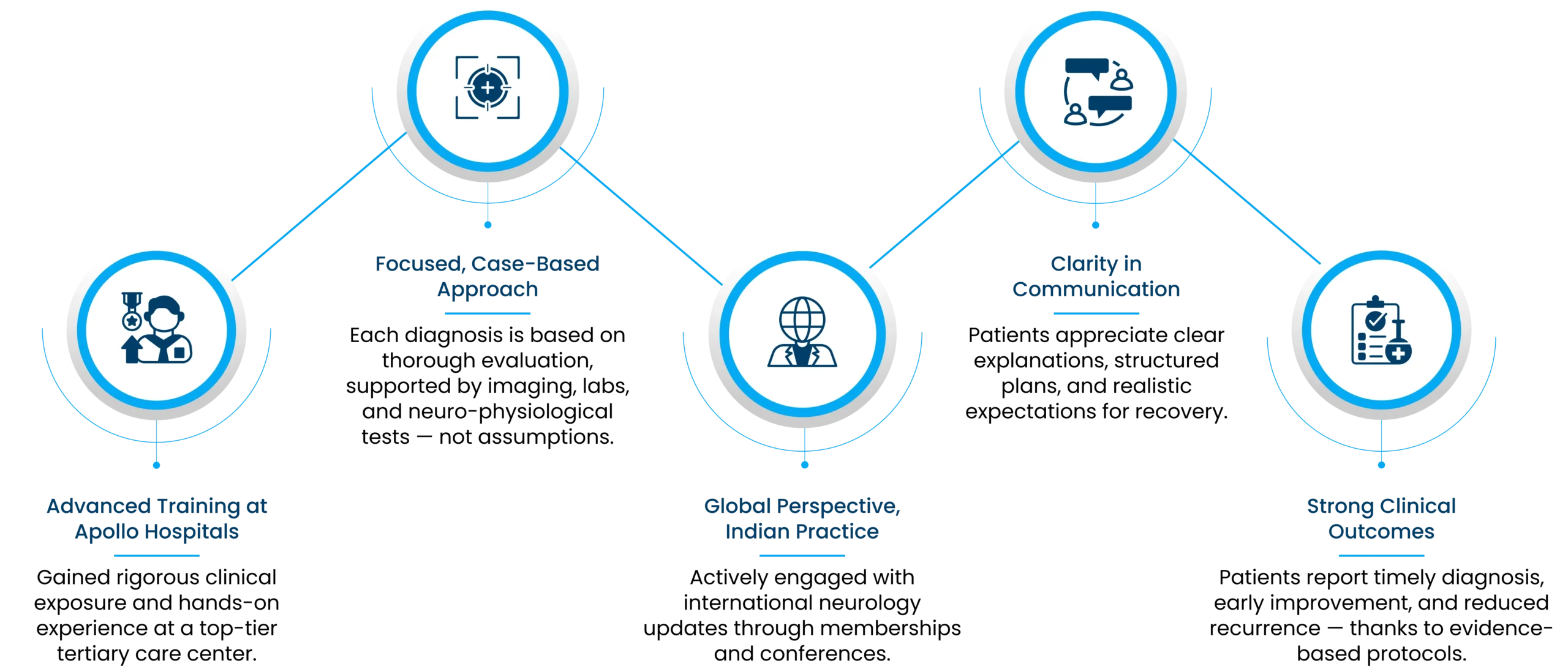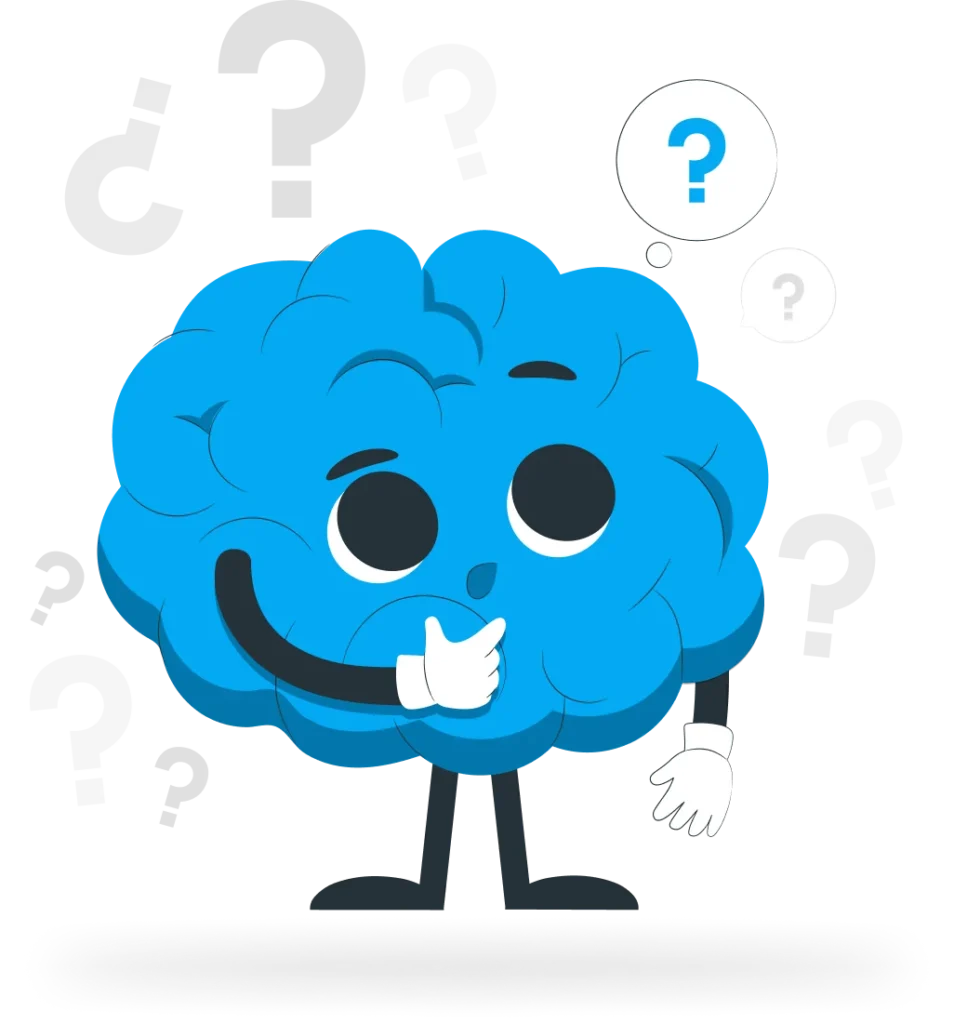When Your BRAIN
NEEDS HELP, Trust the Best Neurologist in Delhi
Advanced neurological care rooted in compassion
Award-Winning Neurologist
1000+ Neurology Cases Handled
Rated 4.9★ by Patients

Award-Winning Neurologist
1000+ Neurology Cases Handled
Rated 4.9★ by Patients

Meet
Dr. Shishir Pandey
One of the Best Neurologists in Delhi
Dr. Shishir Pandey is a trusted neurologist with over 10 years of experience in treating complex brain and nerve disorders.
He completed his DrNB in Neurology from Indraprastha Apollo Hospital, New Delhi, and is affiliated with top global bodies like the World Stroke Organization and the American Academy of Neurology.
Known for his clinical precision and patient-first approach, Dr. Pandey combines advanced neurological care with clear communication and empathy.
Achievements

Travel Grant Award
Movement Disorder Congress, Madrid

2nd Prize
Resident Quiz,
DNACON 2022

3rd Prize
E-Poster Presentation, DNACON 2022

2nd Prize
Resident Quiz,
WSDCON 2021
Neurological Treatments Offered
Brain Stroke Treatment
Epilepsy Treatment
Parkinson's Disease Treatment
Migraine Treatment
Dementia Treatment
Neurological disorders treatment
Testimonials
From Patients Who Are Happy With Our Service
Trustindex verifies that the original source of the review is Google. Trustindex verifies that the original source of the review is Google. I had the privilege of consulting with Dr. Shishir Pandey, and I can confidently say that he is one of the most exceptional neurologists I have ever encountered. From the moment I stepped into his office, I felt welcomed and at ease. Dr. Pandey's warm demeanor and genuine concern for his patients are truly remarkable. Dr. Pandey's extensive knowledge and expertise in neurology were evident throughout my consultation. He took the time to thoroughly explain my condition, answer all my questions, and address any concerns I had. His ability to simplify complex medical information made me feel informed and empowered about my health.Trustindex verifies that the original source of the review is Google. Excellent service!Trustindex verifies that the original source of the review is Google. Trustindex verifies that the original source of the review is Google. Trustindex verifies that the original source of the review is Google. Trustindex verifies that the original source of the review is Google. Trustindex verifies that the original source of the review is Google. Trustindex verifies that the original source of the review is Google. Trustindex verifies that the original source of the review is Google.
Why Patients Trust Dr. Shishir Pandey
A few key reasons why patients consistently choose Dr. Shishir Pandey for neurological care:

Advanced Training at Apollo Hospitals
Gained rigorous clinical exposure and hands-on experience at a top-tier tertiary care center.
Focused, Case-Based Approach
Each diagnosis is based on thorough evaluation, supported by imaging, labs, and neuro-physiological tests — not assumptions.
Global Perspective, Indian Practice
Actively engaged with international neurology updates through memberships and conferences.
Clarity in Communication
Patients appreciate clear explanations, structured plans, and realistic expectations for recovery.
Strong Clinical Outcomes
Patients report timely diagnosis, early improvement, and reduced recurrence — thanks to evidence-based protocols.
Watch Dr. Shishir in Action
Get patient-friendly insights and expert advice on
Brain and nerve health
Stroke prevention & recovery
Epilepsy, dementia, and more
- When India’s top hospitals trust a neurologist, you can too.

Need Help with a Brain or Nerve Condition?
Headaches, memory issues, or dizziness? Don’t wait.

Consult Dr. Shishir Pandey for expert, personalized neurological care.
Need Help with a Brain or Nerve Condition?
Headaches, memory issues, or dizziness? Don’t wait.


Consult Dr. Shishir Pandey for expert, personalized neurological care.
Frequently Asked Questions
Neurological disorders can present with various early signs, including persistent headaches, sudden vision changes, unexplained numbness or tingling, difficulty walking, and memory problems. Recognizing these symptoms early can lead to timely intervention.
Neurological disorders can present with various early signs, including persistent headaches, sudden vision changes, unexplained numbness or tingling, difficulty walking, and memory problems. Recognizing these symptoms early can lead to timely intervention.
Neurological disorders can present with various early signs, including persistent headaches, sudden vision changes, unexplained numbness or tingling, difficulty walking, and memory problems. Recognizing these symptoms early can lead to timely intervention.
Neurological disorders can present with various early signs, including persistent headaches, sudden vision changes, unexplained numbness or tingling, difficulty walking, and memory problems. Recognizing these symptoms early can lead to timely intervention.
Neurological disorders can present with various early signs, including persistent headaches, sudden vision changes, unexplained numbness or tingling, difficulty walking, and memory problems. Recognizing these symptoms early can lead to timely intervention.
Neurological disorders can present with various early signs, including persistent headaches, sudden vision changes, unexplained numbness or tingling, difficulty walking, and memory problems. Recognizing these symptoms early can lead to timely intervention.
Neurological disorders can present with various early signs, including persistent headaches, sudden vision changes, unexplained numbness or tingling, difficulty walking, and memory problems. Recognizing these symptoms early can lead to timely intervention.
Frequently Asked Questions

Neurological disorders can present with various early signs, including persistent headaches, sudden vision changes, unexplained numbness or tingling, difficulty walking, and memory problems. Recognizing these symptoms early can lead to timely intervention.
Neurological disorders can present with various early signs, including persistent headaches, sudden vision changes, unexplained numbness or tingling, difficulty walking, and memory problems. Recognizing these symptoms early can lead to timely intervention.
Neurological disorders can present with various early signs, including persistent headaches, sudden vision changes, unexplained numbness or tingling, difficulty walking, and memory problems. Recognizing these symptoms early can lead to timely intervention.
Neurological disorders can present with various early signs, including persistent headaches, sudden vision changes, unexplained numbness or tingling, difficulty walking, and memory problems. Recognizing these symptoms early can lead to timely intervention.
Neurological disorders can present with various early signs, including persistent headaches, sudden vision changes, unexplained numbness or tingling, difficulty walking, and memory problems. Recognizing these symptoms early can lead to timely intervention.
Neurological disorders can present with various early signs, including persistent headaches, sudden vision changes, unexplained numbness or tingling, difficulty walking, and memory problems. Recognizing these symptoms early can lead to timely intervention.
Neurological disorders can present with various early signs, including persistent headaches, sudden vision changes, unexplained numbness or tingling, difficulty walking, and memory problems. Recognizing these symptoms early can lead to timely intervention.
